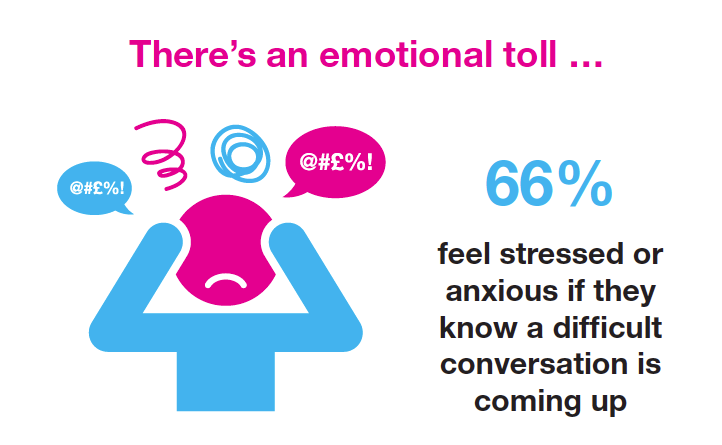No single conversation is guaranteed to initiate transformational change but each conversation has the potential to make a significant impact. Leaders understand the inherent power of conversations and engage accordingly.
Imagine sitting at a boardroom table and you draw a line extending from right to left across that table. On one end of the line, you write the word “Healthy” and on the opposite end you write the word “Toxic.” The current state of every relationship you have – at home and at work – can be plotted somewhere along that line.
According to Susan Scott, author of Fierce Conversations, each relationship arrived where it is one conversation at a time – one fruitful conversation, one failed conversation, or one missed conversation at a time.
Conversations are the most important work of leadership. If you want to improve your leadership, improve your conversations.
[bctt tweet=”Conversations are the most important work of leadership. If you want to improve your leadership, improve your conversations.” username=”BrettPowellorg”]
Here are four things leaders can do to master conversations that matter:
First – Enter In: The first step to a meaningful conversation is to overcome anxiety and engage. Much is lost when leaders fail to engage by avoiding the topic, changing the subject, or using humour as a diversion.

We divert discussion from the deep-end back to the shallow-end where we are comfortable and have our footing. When something inside you begins to sense, “This is an important conversation,” take a deep breath and enter in more intentionally.
[bctt tweet=”So much is lost when leaders fail to engage in deep dialogue by avoiding the topic or using humour as a diversion.” username=”BrettPowellorg”]
State something you believe to be true or ask an authentically curious question and listen intently to understand. Become fully present to the other person and the conversation.
Second – Explore Reality: One reason we avoid meaningful conversation is to avoid conflict. Conversations are difficult when stakes are high and opinions vary. Often there is a conflict in the perception of reality not just a conflict of opinion. There is your reality, the other person’s reality, and various combinations of the two. Navigating multiple realities can be confusing.
When we agree to explore reality together, trying to see from the other person’s perspective, there is a better chance of mutual understanding. Consider two people staring at the same Canadian quarter. Each of them describes in detail their vision of reality. One person speaks of the Queen with her dignified countenance and noble crown. The other speaks of the head of a caribou with a full rack of antlers. Who is seeing reality, they both are!

How many conversations have you had when, after countless attempts at convincing each other of seeing what you see, you simply agree to disagree? That would be a failed conversation. A failed conversation is any conversation that does not lead to mutual understanding.
[bctt tweet=”A failed conversation is any conversation that does not lead to mutual understanding.” username=”BrettPowellorg”]
Exploring reality means giving pause during the discussion, especially when heated, and looking at reality from the other person’s point of view. If we overcome our need to be right, and open ourselves to learning in conversation, it opens both parties to deeper and more meaningful conversations.
The authors of Crucial Conversations referred to this as the practice of developing a shared pool of meaning. Each person in a conversation has a pool or meaning – their insights, perspective, feelings and interpretation of what is being discussed. The best conversations develop a shared pool of meaning among all participants.
Third – Make it Safe: The greatest enemy of meaningful conversations is fear. Deep dialogues go beyond sharing information. They venture into the emotions of the discussion and that introduces risk and risk introduces fear.
Anxiety triggers the primitive part of the brain called the amygdala, which controls our fight or flight response. Also, fear inhibits the higher parts of the brain which control empathy, compassion, and curiosity. As fear increases, people tend to move towards silence or violence.
[bctt tweet=”As fear increases, people tend to move towards conversational silence or violence. Create a safe place for discussion by assuring the other of your pure intentions, profound respect, and genuine concern. ” username=”BrettPowellorg”]
Conversational silence includes putting on a false front or posing, giving the cold shoulder, or withdrawing altogether. Conversational violence is about gaining control of the conversation by using an aggressive tone, volume, and posture.
Leaders with conversational intelligence recognize when they or others are shifting to silence or violence. They begin to internally step out of the conversation to focus on the one thing that matters most – creating a safe place to talk. Non-verbal communication such as gentle eye-contact, attentive listening, expressing curiosity, and an open posture are important here.
The key for you as a leader is to assure the other of your pure intentions, profound respect, and genuine concern. Once they sense your benevolence, they will begin to feel safe again.

Fourth – Cultivate Trust: The importance of trust can never be over-stated. Building trust on a daily basis is the best preparation for a difficult conversation in the future. When opportunities for meaningful dialogue arise, it is too late to prepare.
[bctt tweet=”Building trust on a daily basis is the best preparation for a difficult conversation in the future. ” username=”BrettPowellorg”]
Trust is built between conversations by investing in the relational bank account. Stephen Covey began teaching this 30 years ago but it is as true today as it was back then. As you make deposits of kindness, integrity, empathy, curiosity, and compassion, you are strengthening relational bonds. You will need to lean on that trust when having a difficult conversation. Building trust day-by-day is the most important responsibility of leaders. Trust is the one thing that changes everything in a conversation.
Final thought: Meaningful dialogue establishes authentic leadership, moving from power over others to power with others. The surest way to build healthy, vibrant relationships is through honest, meaningful, and unencumbered conversations.
[bctt tweet=”Meaningful dialogue establishes authentic leadership, moving from power over others to power with others. ” username=”BrettPowellorg”]
Leaders who routinely engage in meaningful dialogue create healthier relationships, establish stronger coalitions, and experience a more fulfilling life. If you want to change your leadership, change your conversations.

